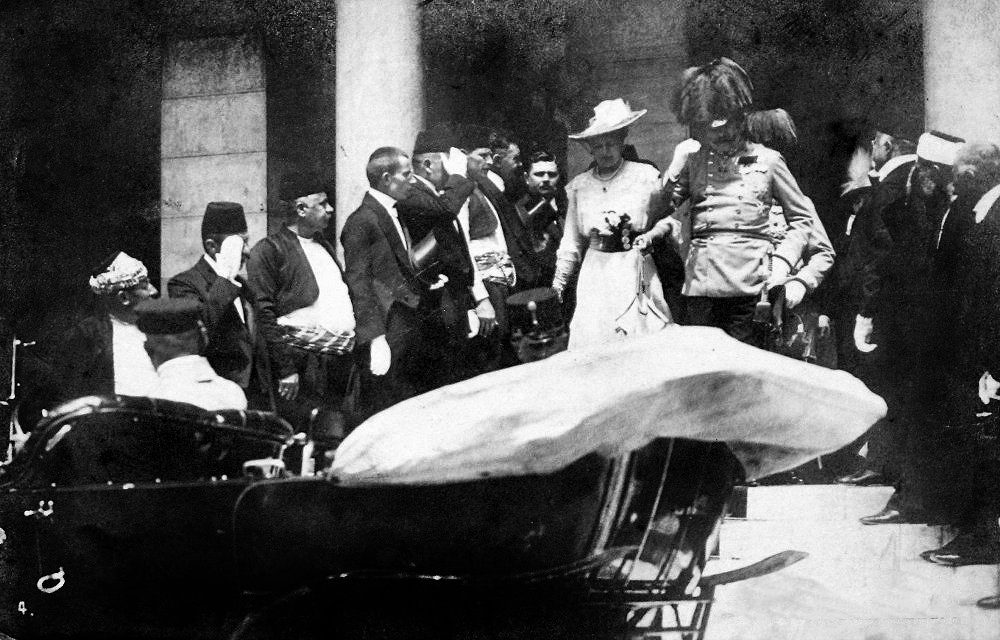The assassination of Archduke Franz Ferdinand on June 28, 1914, is widely considered the event that sparked World War I. This article explores the details of the assassination and its consequences, leading to the outbreak of one of the deadliest conflicts in history. The assassination took place in Sarajevo, Bosnia, when a Serbian nationalist shot the archduke and his wife. Austria-Hungary blamed Serbia and issued an ultimatum, escalating tensions. The complex system of alliances then dragged Germany, Russia, and France into the conflict. The war had far-reaching consequences, altering the geopolitical landscape and causing millions of deaths. The Treaty of Versailles, which blamed Germany, set the stage for the rise of Adolf Hitler and the Second World War. This event serves as a reminder of the interconnectedness of global events and the importance of diplomacy in preventing future tragedies.
The Assassination of Archduke Franz Ferdinand: The Spark that Ignited World War I
Introduction
The assassination of Archduke Franz Ferdinand, heir to the Austro-Hungarian throne, on June 28, 1914, is widely regarded as the event that lit the fuse for World War I. This article delves into the details surrounding the assassination, its significance, and the chain of events that led to the outbreak of one of history’s deadliest conflicts.
The Assassination
The assassination took place in Sarajevo, Bosnia, during Archduke Franz Ferdinand’s visit to the region. The archduke and his wife, Sophie, were riding in an open-top car when a group of Serbian nationalists, part of a secret organization known as the Black Hand, plotted to carry out the assassination. One of the assassins, Gavrilo Princip, seized the opportunity and shot the couple at close range, killing them instantly.
Consequences of the Assassination
The assassination of Franz Ferdinand sent shockwaves throughout Europe. Austria-Hungary, which blamed Serbia for the attack, issued an ultimatum to Serbia, demanding harsh terms and the punishment of those involved in the assassination. Serbia’s refusal to comply with all the demands led to the escalation of tensions between the two countries.
The Outbreak of War
As Austria-Hungary prepared to take military action against Serbia, a complex system of alliances came into play. Germany, Austria-Hungary’s closest ally, issued a “blank check” that promised unconditional support in any conflict. Serbia, on the other hand, turned to Russia, seeking protection. Russia, bound by an alliance with Serbia, began mobilizing its forces. Germany, fearing a two-front war, declared war on Russia and its ally France.
With the onset of hostilities between these major powers, a domino effect occurred. The alliance system dragged many other countries into the war. Britain, who had various diplomatic ties to both sides, found itself pulled into the conflict. World War I had officially begun.
Significance of the Assassination
The assassination of Archduke Franz Ferdinand had far-reaching consequences that were not simply confined to the Balkan region. It exposed the underlying tensions and rivalries between European powers, the failure of diplomatic negotiations, and the fragility of the international order.
This event, along with the circumstances and actions that followed, had a profound impact on shaping the course of history. The war that ensued altered the geopolitical landscape, caused millions of deaths, and laid the foundations for the subsequent conflicts of the 20th century.
Legacy
The assassination of Archduke Franz Ferdinand heralded a new era of warfare and ushered in an age of total war that engulfed the world. The technological advancements of the time, combined with the complex alliance system, made World War I a global conflict on an unprecedented scale.
Furthermore, the impact of the war was felt not just on the battlefield but also on political, social, and economic fronts. The Treaty of Versailles, which was signed at the end of the war, placed the blame solely on Germany, laying the groundwork for the rise of Adolf Hitler and the Second World War.
Conclusion
The assassination of Archduke Franz Ferdinand and the subsequent events unleashed a catastrophic chain reaction that resulted in World War I. The tensions, rivalries, and alliances between European powers set the stage for this devastating conflict that forever changed the course of history. Understanding this pivotal moment in time helps shed light on the complexities and interconnectedness of global events, reminding us of the importance of diplomacy and peaceful resolutions to avoid repeating similar tragedies in the future.
